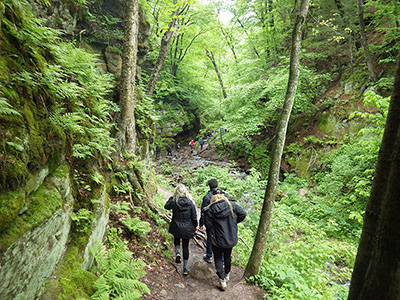First Year Students must use information posted on DEEPS.northwestern.edu

Our new DEEPS.northwestern.edu webpage has the new curriculum required of first year students starting Fall 2025.
The following is posted for students in program prior to Fall 2025.
Are you fascinated by the immensity of galaxies, as well as the intricacy of microscopic shell structures seen under a scanning electron microscope? Do you seek that "CSI Miami" experience of reconstructing billion-year old landscapes long turned to dust and pressed into stone? Is your secret mission to solve the world's energy problems? Are you eager to support both human and environmental health and safety as climate change increases the stakes? Does your breadth of scientific interests make it hard to choose a career within just one field: chemistry, math, biology or physics? Perhaps you are most intrigued by an interdisciplinary synthesis of them all.
If so...Earth and Planetary Sciences might be for you!
Visit our major page to learn how the major requirements are organized into different sub-disciplines and skills areas. Sub-disciplines: Earth Materials, Geochemistry, Seismology, Geology, Climate/Paleoclimate, Geophysics, Geobiology, Planetary. Skills areas: Quantitative, Spatial Reasoning, Analytical/Instrumentation/Field. We also invite you to visit our minor page.
As a Major or Minor you will have opportunities to participate in a wide range of departmental activities beyond the classroom, including research, seminars, field trips, and social events. Many undergraduates conduct research projects with faculty and graduate students that lead to honors theses and scientific publications.
To get started in the Major, take the prerequisite courses as soon as possible:
- MATH 220, 224, and 230 (or equivalent)
- 6 additional related math and science lecture courses with their associated labs (if applicable) from:
- CHEM 131/141, 132/142, 151/161, 152/162, 171/181, 172/182
- PHYSICS 135-1,2,3 with lab courses 136-1,2,3
- BIOL SCI 215, 219 with lab courses 220 and 221
- MATH 234, 240, and 250
Earth Systems Revealed (EARTH 201) is one of our core courses and is taught each year during the spring quarter. No prerequisites are required to take the course. EARTH 201 combines aspects of physical and historical geology. Physical geology examines Earth materials (rocks and minerals) and the processes that create, modify, and destroy them. Historical geology examines the origin of Earth and its development through time. The course culminates with a required weekend field trip to Baraboo, WI, usually during the third weekend in May. As the Earth and Planetary Sciences Department has led the Baraboo field trip for over 90 years, taking EARTH 201 presents an excellent opportunity to participate in one of Northwestern’s best-kept secret traditions. Have you ever wondered about the origin of the “The Rock”? Come to Baraboo to find out!
As an Earth and Planetary Sciences Major, this sample four-year plan is a good starting place for planning your plan of study. Your actual plan of study will be shaped by the WCAS degree requirements and modified by advanced standing earned through placement tests and AP credits.
YEAR 1
| Fall | Math and Science Prerequisites |
| Winter | Math and Science Prerequisites |
| Spring | Math and Science Prerequisites + EARTH 201 |
Consider EARTH First Year Seminars towards your WCAS Writing Requirement, with topics such as: Death of the Dinosaurs, Sustainability and Social Justice, and Global Warming: The Scientific Evidence.
YEAR 2
| Fall | Remaining Math and Science Prerequisites, + EARTH 203 |
| Winter | Remaining Math and Science Prerequisites, + EARTH 202 and 204 |
| Spring | Remaining Math and Science Prerequisites |
One or more EARTH 300 levels in any quarter.
YEAR 3
| Advanced Studies 300- level courses, up to eight |
| EARTH 399 - Independent Study |
YEAR 4
| Advanced Studies 300- level courses, up to eight |
| EARTH 399 - Independent Study |
Advising
Our advising page contains more information about declaring the major and other useful resources. If you have questions or need more information, contact the Program Assistant to set an appointment with the Director of Undergraduate Studies (DUS).
Learn More
There are several ways you can learn more about Earth and Planetary Sciences.
- Our majors participate in a wide variety of department-led field trips, including the Yucatan Peninsula, Mammoth Cave, and even kayaking the Chicago River.
- We invite you to attend our seminar series. Here, you can learn about the latest developments in the field as well as meet faculty and other students in our department.
- You can read student impressions about Earth and Planetary Sciences.
- Interested in conducting research? Our majors conduct a wide variety of projects.
- Careers in the earth sciences and beyond…visit our careers page for more information.
If you wish to keep current about social functions, department activities, research opportunities, and job openings, please contact us about being added to the Department’s undergraduate e-mail listserv.
